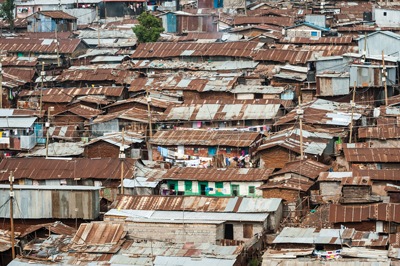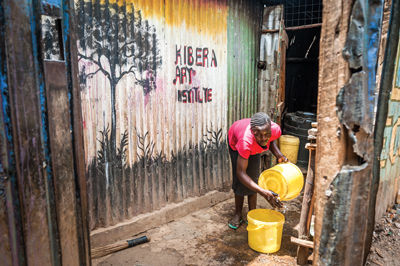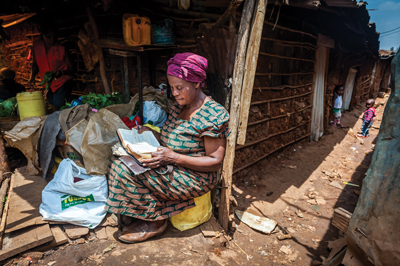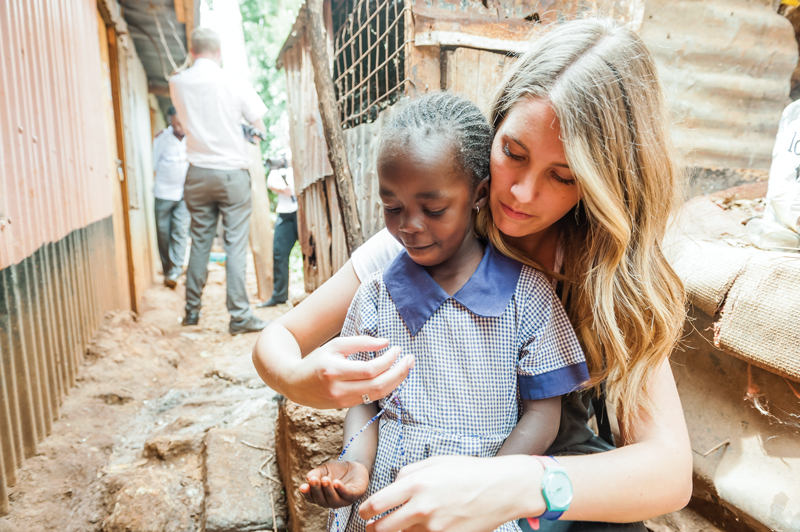 The Kibera slums are home to an estimated 1.5 million people. Many houses are built with mud, sticks and sheet-metal roofing
The Kibera slums are home to an estimated 1.5 million people. Many houses are built with mud, sticks and sheet-metal roofing
In the heart of this slum, The Salvation Army operates a church, nursery and microfinance project.
Bettering Their Future
I first glimpsed the Army’s Kibera facility from our van as it squeezed between the sheet-metal storefront of a coal merchant and a mud wall, and entered a guarded entrance. When the iron doors closed behind us, the roar of the slum became a hushed hum in the spacious compound.
Since many families living in Kibera cannot afford to send their children to school, the Army employs local teachers to instruct two full classes for young children. Upon arrival, the children are provided breakfast, which often consists of porridge. For many, this is their only meal of the day.
It was in this schoolyard where I met Pamela and Caroline, two mothers whose children attend the nursery. I watched as they joined other mothers in a shaded area. Each took a plastic chair and began stringing brightly coloured beads onto chicken wire. These strands of beads were then modelled into red reindeer figurines, which are sold to visitors for 450 Kenyan shillings ($4.50).
 A young girl cleans a plastic water pail in front of a mural that reads, “Kibera Art Institute”
A young girl cleans a plastic water pail in front of a mural that reads, “Kibera Art Institute”
Heavy on the Heart
When the school day had closed, I joined Pamela, Caroline and Caroline’s daughter, Brianna, on their walk home. With armed police escorting our team through the narrow, winding alleys, I felt a familiar rhythm to the buzzing slum economy. I quickly realized that the labyrinth of clothing lines, chicken-wired store windows, coal vendors, butcher shops and mango stands share many similarities with western entrepreneurship. There is joy, hope and resilience in the slum; however, the one obvious difference is that the families buying and selling in the market do so out of a will to provide and survive, with no room for excess.
This became evident when we entered Pamela’s house. Just a small mud hut, it is home to almost a dozen people. The house, which resides on the lowest elevation of Kibera, frequently floods with sewage during heavy rainfalls. As the household matriarch, Pamela often finds herself on the floor, scrubbing away the waste. Later, at Caroline’s home, I took a polaroid photo of her and her daughter. While holding the only printed photo of her daughter, Caroline prayed that Brianna would grow up loving God and knowing he loves her back.
 Pamela outside her home in Kibera
Pamela outside her home in Kibera
Casting Your Vote
It’s easy to walk into a slum and identify problems. Far more disturbing was the revelation that even though it’s unjust that so many survive on so little, it’s far more unjust that I could survive on a whole lot less. In the wake of obvious need, it’s easy to be generous. What’s difficult is adopting the discipline of self-denial in a culture that tells us we never have enough. It was in Kibera that I came to understand the mission of The Salvation Army in new and surprising ways. That when our heart is aligned with God, when our heart breaks for what breaks his, when our present is disrupted and when our understanding of ourselves is disturbed, we are mobilized to action.
Eight months after navigating the labyrinth of Kibera, I have challenged young people at Army youth retreats to “Disturb the Present,” to grow into a deep relationship with that which disturbs them most.
 A woman reads from the Book of Mark in the Bible
A woman reads from the Book of Mark in the Bible
This is also why I believe that in order to know God better, we need to be in community and in partnership with suffering humanity. For me, it took standing in a mud house the size of my bedroom to understand that denying myself elevates others.
The money in our wallets, the hours in our days and the actions in our lives are votes, and where we cast them matters. It is through our actions, and the way they impact our communities on both a local and global scale, that we become missional.
You don’t have to go to Kibera to achieve that.










Comment
On Tuesday, March 13, 2018, Dave Langford said:
Leave a Comment